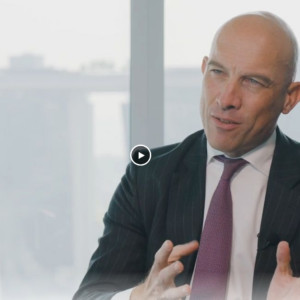
Best private bank for client acquisition, Asia
Axis Bank
Burgundy Private, Axis Bank’s private banking business, has achieved significant growth since its launch two years ago, by leveraging digital tools as well as the internal ‘ecosystem’. It serves more than 3400 families and manages $10bn in client assets.
The Indian institution has developed digital capabilities to augment client onboarding and acquisition, including a video-based digital account opening and a platform to assist non-resident Indian clients open their accounts in India.
A ‘sales intelligent platform’, utilising social media, allows sales professionals to build and maintain relationships with prospective clients. These include millennial founders of new-age tech companies, many of whom “are active on social media platforms and amenable to a digital or social media outreach,” says Satheesh Krishnamurthy, executive vice president, affluent business, Axis Bank. “A successful exchange on the social media platform can be followed by a virtual and/or personal meeting, per their preference, to discuss various opportunities.”
Seventy per cent of the bank’s customers are registered and regularly use one or more digital platforms provided by the bank. “We are seeing a trend where clients increasingly prefer to use digital tools for their financial transactions,” adds Mr Krishnamurthy.
The portfolio analytics tool, which enables a consolidated view of the entire portfolio through web and mobile app, has been “highly appreciated” by clients.
The bank offers self-directed investment platforms for relatively simple and easy to understand investment products. For investments in products such as portfolio management schemes or alternative investment funds, clients prefer a discussion with their private bankers before taking a decision.
The execution for such products is , however,“still largely manual” and the bank is exploring solutions to digitalise and simplify the investment process. ET
Best private bank for digitally empowering RMs, Asia
CTBC Bank
CTBC Bank’s recent performance, including increases to its high net worth (HNW) customers and assets under management in 2021, can be attributed at least in part to the strength of its underlying digital propositions. In particular, the bank has empowered its relationship managers (RMs) with the information and tools required to succeed in a competitive market. This includes the use of artificial intelligence technology to identify and segment HNW individuals from the subsidiaries of CTBC Holdings. By evaluating more than 10 different criteria, the artificial intelligence solution is able to locate new HNW clients and provide the bank’s relationship managers with a fresh means of reaching this customer segment.
In addition, CTBC Bank hosted five virtual courses during the Covid-19 pandemic covering a range of different topics, from mergers and acquisitions, to art investment, family succession and alternative investments, helping drive engagement between wealthy individuals and RMs after each event. CTBC Bank is also the first private bank in Taiwan to launch an asset allocation engine, known as Intelligent Manager Asset Platform (iMAP). This helps RMs develop personalised investment portfolios based on client preferences instantly.
“CTBC has prioritised initiatives to digitally empower RMs; from identifying potential HNW customers, deepening customer relationships, such as the use of internal and external corporate data to identify potential HNW customers in CTBC holdings, the launch of iMAP and providing zero-contact financial services, resulting in outstanding performance despite the impact of Covid-19,” says Amy Yang, chief executive, retail banking and head of international retail banking group, CTBC Bank. JK
Best private bank for use of technology, Asia;
Best CRM for private banking, Asia
DBS Bank
Rather than being a follower of technological trends, Singapore’s DBS Private Bank has long seen itself as a pre-emptor of them, constantly building new structures for client engagement, in line with the firm’s “innovate or die” mantra laid down by group chief executive Piyush Gupta.
At the heart of this philosophy is the need to think like a fintech rather than a bank, especially when it comes to the deployment of data and its translation into intuitive, hyper-personalised insights tailored for each client’s unique needs.
Examples of these include helping clients to capture timely opportunities by automatically alerting them to price movements in their equity and foreign currency holdings, identifying stocks they are likely to be interested in, and helping to ease their time-strapped schedules by cutting through the “clutter of information” and delivering what they want to receive.
Data insights from across the organisation are also collated for relationship managers through the Client Connect platform, which “nudges” advisers into pro-actively starting conversations most relevant to client needs.
“Over the last few years, we’ve heavily invested in our data architecture and capabilities – for example, we gathered the bank’s data from across all our different systems into one data lake to ensure consistency, speed, and re-usability,” says Evy Theunis, head of customer segment and customer science, DBS Bank. “We also designed our architecture with scale and reusability in mind.”
One of the key discoveries the bank has made from this data is that digital behaviour is typically shaped by the individual’s psychology – whether they see themselves as a trader, active or passive investor – rather than their level of wealth or overall financial needs. “It is important to first understand the needs of these different investor profiles in order to serve them appropriately, and also harness our data insights to further enhance the quality of our service and advisory,” suggests Ms Theunis.
But she admits that these changes are only possible with the right quality of individuals at the helm: “Fundamentally, a business’s tech prowess is only as good as the people running it.” YB
Best private bank for digital portfolio management, Asia
ICBC Private Banking
ICBC Private Banking’s digital portfolio management solution offers its clients personalised asset allocation strategies developed through use of big data models and financial technology. A five-step approach to asset allocation includes a client position review, market analysis, allocation proposal, product recommendation and dynamic adjustment. The bank claims the portfolio management system is able to choose “first-rate products for customers”, remain alert to potential risks and provide tools to allocate assets that align with standardised or personalised requirements.
The bank says its digital portfolio management system is a new starting point to pursue the service pattern of a buyer’s advisory and asset allocation. “We continuously explore new paths for ICBC PB’s digital intelligence service, contributing the wisdom and power of ICBC to the sustainable development of China’s wealth management market,” it adds.
The application permits mutual interaction with customers through the use of system-specific display tools, while a complete view of a client’s assets under management and return structure is also provided.
In addition, ICBC Private Banking’s clients benefit from the full range of “exclusive products” from the bank’s different departments including fund, wealth management, insurance and deposit products. Relationship managers and investment advisers work together with the system to coordinate Know Your Customer and Know Your Product principles to meet key client objectives. JK
Best private bank for digital customer service, Asia
Industrial Bank Co. Ltd.
Last year, Industrial Bank launched the ‘online private smart wealth management adviser’ for private banking clients, acknowledging the growing importance of digitalisation in investment and wealth management services, as well as the rising influence of younger cohorts.
“The younger generation is gradually taking control of social wealth, they are more internet-minded and self-aware, and will tend to choose their investment methods more ‘autonomously’,” states Xuxian Dai, general manager of Industrial Bank private banking.
The new solution aims to help clients “plan their own wealth investment solutions and increase their potential capital investment”. Customers can trade funds on their own and seek help from professional investment advisers when needed.
The digital, scenario-based platform provides the client with personalised investment advice, intuitive and easy to understand data about products and evaluation of fund managers as well as other real time, bespoke information, based on big data and “customers’ personal portraits”.
The standardised online investment advisory system can “effectively reduce costs” for the bank, while allowing private bankers to focus on serving clients with complex needs.
But the journey to digitalisation does present challenges. The biggest one is finding the “balance between AI and traditional account management service”, says Mr Dai, explaining that the “current intelligent system has certain limitations in the face of more complex wealth management scenarios”.
Looking forward, the Chinese bank is committed to improving its AI-based systems, through partnering with fintech companies and investing in technology. “We will find a balance between manual and AI service through practice,” believes Mr Dai. ET
Best private bank for digital marketing & communication, Asia
Kasikornbank PCL.
Kasikornbank Private Banking communicates with its clients through social media channels in a number of imaginative ways. Notably, the bank has created a Facebook community where its high net worth clients have access to information relating to global investment strategies, while also benefiting from the opportunity to communicate directly with the bank’s in-house experts.
“KBank Private Banking has realised the impact of digitalisation [and the way] it is changing communication. We have shifted the paradigm on communications [by positioning] ourselves into clients’ daily digital lives,” says Jirawat Supornpaibul, private banking group head at Kasikornbank.
In addition, Kasikornbank Private Banking maintains an active presence on YouTube. In 2021, the bank started two regular shows entitled ‘KPB What’s Next’ and ‘KPB Game Changer’. The first show offers customers the chance to hear, in podcast form, the bank’s weekly investment recommendations, while the second offers analysis into some of the world’s most promising new businesses and technologies. These offerings are made available through the bank’s YouTube channel, as well as through Facebook and the messaging application Line.
“Selective communication channels, including YouTube, Facebook and Line Official Account, have been utilised and enable us to stay connected with clients during periods of uncertainty. [They also help] to strengthen trust,” says Mr Supornpaibul.
Beyond social media channels, Kasikornbank Private Banking also provides monthly live streaming of virtual seminars for its clients covering a range of topics. As a feature of this service, lunch is delivered to registered clients’ homes to be enjoyed while watching the seminar. JK
Best private bank for digital wealth planning, Asia
Siam Commercial Bank PCL.
At Siam Commercial Bank, digitalisation plays a key role in helping private bankers monitor client portfolios, while also improving trade execution.
The bank’s wealth planning tool, wPlan, automatically provides asset allocation recommendations by incorporating the CIO’s views, considering clients’ risk appetite, their preferences and investment objectives. It then offers investment options to meet their requirements.
Through one new digital app, customers can set up four types of accounts, for mutual funds, brokerage, both onshore and offshore, bond trading and derivatives.
While new technologies are shaping the expectations and preferences of younger wealthy generations in particular, older clients tend to favour in person relationships with their private bankers.
To stay relevant, “it is vital to offer hybrid advisory”, says Sornchai Suneta, head of CIO office at the Thai bank, which has a strategic partnership with Julius Baer. This means advancing digitalisation and automation, wherever possible, but also striving to offer personalised solutions to clients’ complex needs.
But digital transformation is a bumpy journey. “Legacy systems have been a hurdle to digital transformation efforts. The migration of systems to one single platform is always an obstacle to system improvement,” acknowledges Lalitphat Toranavikrai, CEO SCB-Julius Baer Securities and head of private banking, Siam Commercial Bank. Change of culture is another issue but can be “fixed” through training and “enforced adoption”, she adds, believing it is a long-term process.
One of the bank’s priorities is to improve its investment alert system, to inform clients of deviations of their portfolio from the model portfolio and make them aware of investment opportunities. ET
Best digital innovator of the year, Asia
Taipei Fubon Bank
Taipei Fubon Bank’s emphasis on digital transformation has generated a number of initiatives in data analytics and open source software. In June 2021, the bank created a data empowerment centre to “generate and enhance” data-related applications and offerings. Boasting a dedicated team of in-house data scientists, the new centre is responsible for managing Taipei Fubon Bank’s data analysis services and developing a data ecosystem throughout the organisation.
“We have has been firmly committed in recent years to building a data-driven corporate culture focused on digital transformation,” says Tony Chen, chief digital officer at Taipei Fubon Bank. “We fully utilised data and analytics to help our organisations respond to market changes faster. By harnessing data analytics, businesses can predict future trends, identify consumer behaviours and detect new business opportunities more quickly, creating the potential for obtaining a market advantage.”
Meanwhile, the use of open source software has helped Taipei Fubon Bank to accelerate its approach to product development.
Thanks to its adaptive nature, open source software offers the bank a number of clear advantages when it comes to enhancing operational efficiency and the digitalisation of management operations, among other examples. To mitigate the relative risks associated with the use of open source software, Taipei Fubon Bank has developed a risk assessment and “intelligent” monitoring system able to identify threats and raise early warning alerts linked to specific information assets. JK
Best private bank for big data analytics and AI, Asia
Taishin International Bank
Taishin International Bank is harnessing big data to accelerate the next stage of its growth trajectory. Innovations such as its real-time personalised marketing platform are a case in point: when a customer engages with Taishin, the platform is able to evaluate relevant past data for that client, including monthly asset allocation and daily payment behaviour, as well as other data sources, and match it against real-time behaviour.
Through this analysis, the bank can establish the customer’s potential needs and generate the most suitable offering through a number of online and offline channels.
“Coupled with API transmission technology, the real-time personalised marketing platform can calculate the potential needs of customers within one second and provide real-time personalised services,” says Yang Yu-Min, head of the segmentation division, Taishin International Bank.
In this way, Taishin claims it can manage customer journeys through big data. The platform can also adjust its interaction with a client based on their level of interest in what is being offered. Moreover, suitable information is shared and synchronised with customer service and wealth management specialists, who can contribute their own expertise to meet a client’s objectives if required.
The benefits of the real-time personalised marketing platform are emerging across a number of domains. The banks says its ability to respond to customer needs has improved, while the platform’s ability to optimise data from across different departments has had a “positive impact” on overall revenues. JK





